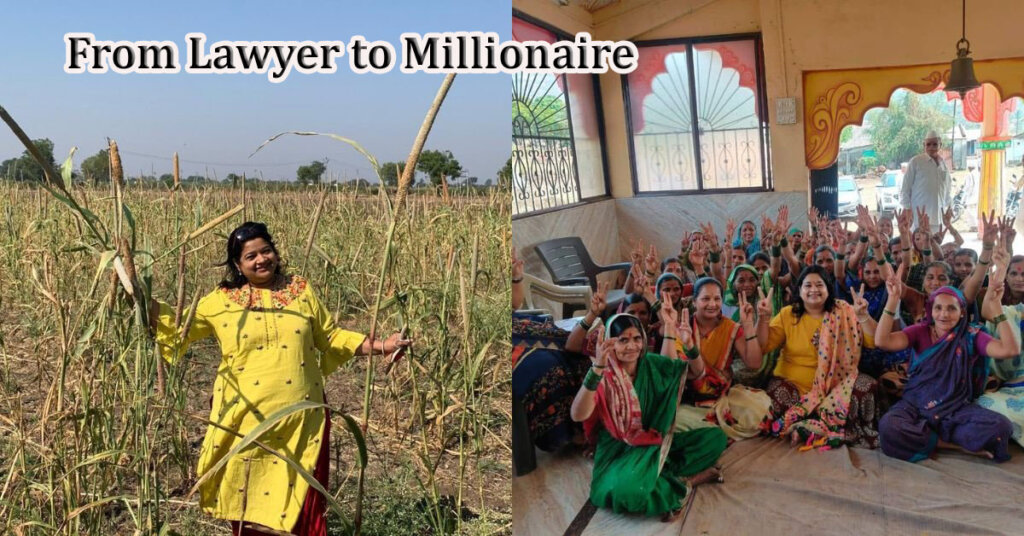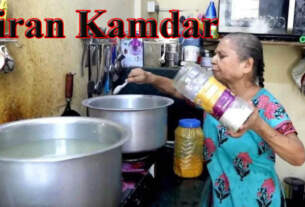“Former Lawyer-Turned-Entrepreneur’s Millet Startup Earns Rs 16 Crore/Year, Transforms Lives of 1.5 Lakh Farmers” Pune resident Sharmila Jain Oswal established the Green Energy Foundation to empower farmers, rejuvenate water sources, and promote smart farming techniques, including millet cultivation. Alongside her son Shubham, she co-founded ‘Gud Mom,’ a venture selling millet-based products. Here’s her inspiring journey as an entrepreneur. Between 2004 and 2006, Maharashtra witnessed a disturbing surge in farmer suicides, with 1,427 reported cases in the state out of a national total of 17,060 in 2006, with Vidarbha being the most affected.
“While I was earning well, I felt disconnected from my roots. I longed to return and support struggling farmers, contributing to our nation’s food security. Growing up in a village, I had witnessed the hardships faced by farmers, and I knew their challenges firsthand. Unfortunately, many government initiatives weren’t reaching them, leading to mounting debts and crop failures,” says Sharmila, aged 52.
In 2008, she made the life-altering decision to leave her job and return to Pune. She embarked on a comprehensive two-year survey across Maharashtra, Gujarat, and Rajasthan to gain insight into the farmers’ ground-level issues.
Subsequently, Sharmila founded the Green Energy Foundation, an NGO committed to offering sustainable solutions to farmers. The foundation concentrates on water source revitalization, implementing intelligent farming practices, and empowering women in agriculture.
Growing up in a small agrarian village in Maharashtra, Sharmila’s father operated a flour mill where millets were the predominant grain. Her childhood experiences exposed her to the challenges faced by farmers and their families. She imbibed two crucial lessons from her father: the significance of millets and the concept of ‘corporate social responsibility’ even before she encountered the term CSR.
Sharmila’s schooling in a Marathi medium school, where many children faced hardships due to their farming backgrounds, further fueled her determination to make a difference. Witnessing the struggles of her schoolmates and family members, particularly women subjected to domestic violence and early marriages, compelled her to become a lawyer to advocate for women facing such challenges.
“I wanted a different life for myself compared to my mother, sisters, or sisters-in-law. I had witnessed my close ones become victims of domestic violence. Girls in my school were deprived of education and married off early. Most women in my orthodox Rajasthani family faced similar issues, including being forced to wear ghungats (head coverings),” she recalls.
Sharmila is grateful for the prioritization of her education by both her father and later her husband. However, the difficulties experienced by the farming community during her upbringing, including crop failures and escalating debts, left a profound impact on her.
“I observed firsthand what farmers and their families go through when their crops fail or when there’s a water shortage. I felt compelled to work towards finding solutions to these problems, especially as the water crisis was worsening,” she adds.
These challenges inspired her to pursue a master’s degree in environmental and agricultural law in England after her marriage. She worked in the UK from 1997 to 1999 before relocating to Canada, where she practiced law until 2007. Her return to India was in response to the plight of Indian farmers.
Upon returning to Pune and establishing the NGO in 2008, Sharmila, armed with a Rs 10 lakh grant from NABARD, initiated her first sustainable water management program in Buchkewadi, Maharashtra, in 2010.
“The entire village, home to approximately 40 farmers, relied on water from a single small dam. We implemented a program to optimize water usage and increase water availability. This involved a comprehensive soil and water assessment, as well as the development of an equitable water distribution model. We also educated villagers on responsible water usage to ensure a consistent water supply even during the summer months,” explains the former lawyer.
Sharmila continued her work across Maharashtra, Rajasthan, and Gujarat. In Dungarpur, Rajasthan, she guided farmers in transitioning from mono-cropping (primarily corn) to cultivating multiple crops.
“Crops like maize require substantial water resources. Therefore, we helped tribal farmers in Dungarpur shift to crops like moong (green gram) that use less water through a partnership with ITC’s e-Choupal. This approach ensured that farmers always had an alternative crop in case of crop failure while providing access to ITC’s marketplace. We also encouraged millet cultivation due to its lower water requirements,” she adds.
Dipti, a farmer from Dungarpur, attests to the benefits of this program and shares that they now cultivate vegetables as well. “Previously, my husband had to seek work in other cities if our crops failed. Now, with lentils and vegetable cultivation, we can sustain ourselves comfortably, even with limited water resources, thanks to the variety of crops,” she explains.
Over the past two decades, Sharmila’s efforts have positively impacted over 1.5 lakh farmers across five states through water management initiatives, millet and vegetable farming, and capacity-building programs, leading to a stable income for these farming families.
Even before the surge in millet’s popularity, Sharmila advocated for its cultivation in arid regions, highlighting its climate resilience, carbon neutrality, and eco-friendliness. Millets thrive with minimal water, making them a sustainable choice.
She encouraged farmers to diversify their crops and conserve water by teaching them to grow various millets like ragi, jowar, proso millet, pearl millet, and vegetables, including exotic varieties like zucchini.
When the COVID-19 pandemic struck, Sharmila’s son Shubham had just completed his bachelor’s degree in political science at Ashoka University and was at home. A conversation about millets and the lack of healthy food options sparked the idea for their startup, ‘Gud Mom.’
“During my time at the university, I observed many of my friends consuming junk food, and we witnessed numerous young people affected by lifestyle diseases. To address this issue and create a market for farmers, we launched a farm-to-fork startup focused on selling millet grains and healthy millet-based snacks,” explains Shubham Oswal.
‘Gud Mom’ offers a range of millet-based products, including noodles, pasta, cookies, crackers, herb sticks, and more, available through their website, Amazon, and various retailers. Most of their grains and ready-to-eat items are priced between Rs 48 and Rs 150.
“Our goal is to establish a healthy ecosystem. Today’s children consume excessive junk food, which is detrimental to their health. We have transformed millets into a variety of appealing products with international flavors and seasonings that resonate with the current generation. We aim to boost the nation’s immunity,” he adds.
The startup currently boasts an annual revenue exceeding Rs 16 crore and collaborates with over 5,000 millet farmers across India.
‘Gud Mom’ received the Best Startup in Organic Farming 2021 award and the ‘Poshak Anaj Award 2022’ from the Indian Institute of Millet Research. Sharmila was also recognized and praised by Prime Minister Narendra Modi for her efforts in promoting millet cultivation during his ‘Mann ki Baat’ program.





